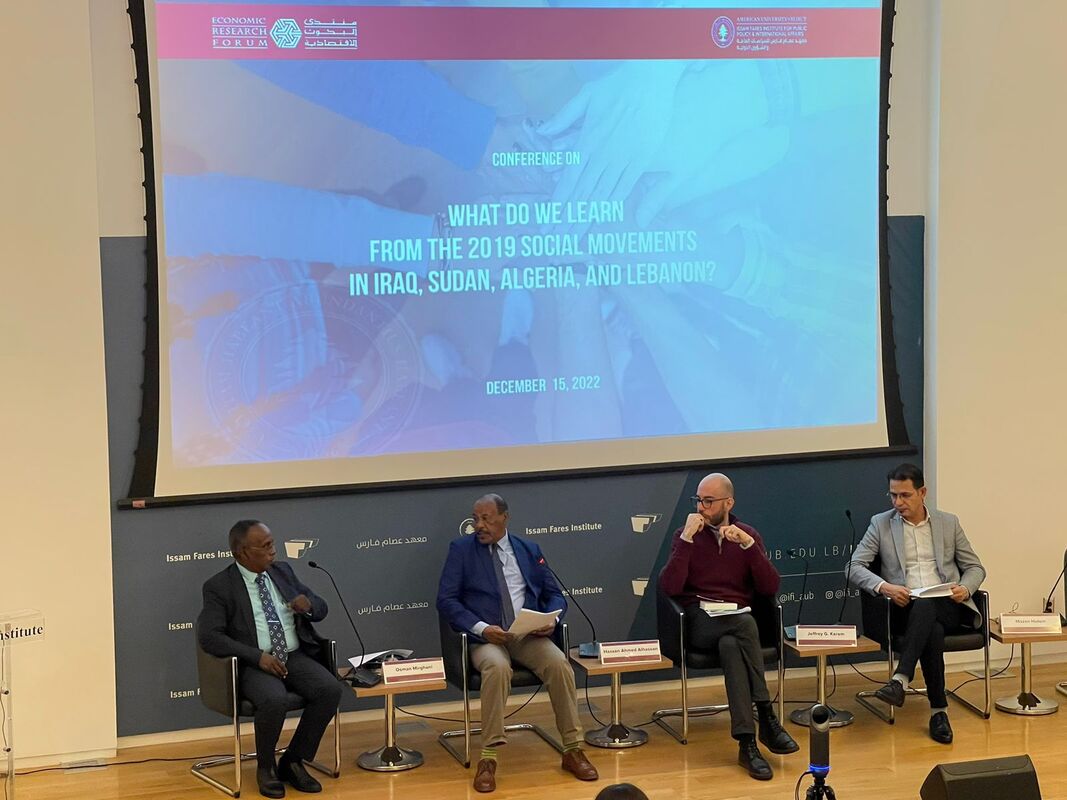|
IFI and the Economic Research Forum (ERF) organized a conference on December 15, titled “What Do We Learn from the 2019 Social Movements in Iraq, Sudan, Algeria, and Lebanon?” Its aim was to focus on the intellectual production stemming from the region's social movements as they happened, their legacy so far, and the lessons drawn to shape a more progressive social contract. The conference started with opening remarks by ERF Managing Director Ibrahim Elbadawi, IFI Director Joseph Bahout, and Ishac Diwan, Director of Research at Finance for Development Lab and IFI Associate Fellow; followed by five sessions, whereby several problematics regarding the social movements were raised and discussed.
During Session 1: “What Happened?” experts discussed the political economy’s underpinnings of the uprisings. According to Jeffrey G. Karam, from the Lebanese American University: “The timing and makeup of Lebanon’s protests was unprecedented. I call it a revolutionary uprising constantly unfolding with ups and downs.” Panelists questioned whether or not these movements were born out of grievances and/or aspirations, and how they compare to the movements of 2011. To clarify Sudan’s stance on the matter, Hassan Alhassan, former speaker of the Sudan Democratic Alliance, noted, “the framework agreement reached in Sudan constitutes the first stage in the political settlement process,” and that “the only guarantor is the continuation of demonstrations.” Session 2: “The Revolutionary Movement” covered the circumstances of the revolutions in the Arab countries in question, namely Iraq, Sudan, Algeria and Lebanon. Speakers commented on the value of citizen protests, stressing that revolutions in general don’t fail. Session 3: “The Feminist’s Hirak” dealt with the active role of women as demonstrators and social activists, and how this affected the patriarchal culture and practice. Panelists stressed that women's participation in the Hirak wasn't the first instance of their political activism. They also discussed how social media played a role in giving women a voice and how this participation led them to take part and engage in the public space. On that point, Osman Mirghani, Chief Editor of Sudan’s Al Tayar Daily noted: “In the midst of social movements, the media has a cumulative role, specifically free and responsible media, to raise awareness among citizens.” Session 4: “The Youth of the Thawra” noted that the youth were on the front lines of protests throughout Arab countries and questioned the extent to which they contribute to cultural-social change. Finally, Session 5: “A Revolution for Nothing? How Did Things Change?” concluded that the Social Movements of 2019 died out due to Covid-19 and repression, whereas those of 2011 were extinguished by force. However, panelists noted there were still lessons that emerged from the movements and highlighted how new dynamics among the population were born after the protests, in addition to progressive and revolutionary gains made throughout. Read more about the conference here and the complete agenda here. Comments are closed.
|
Archives
July 2024
|

